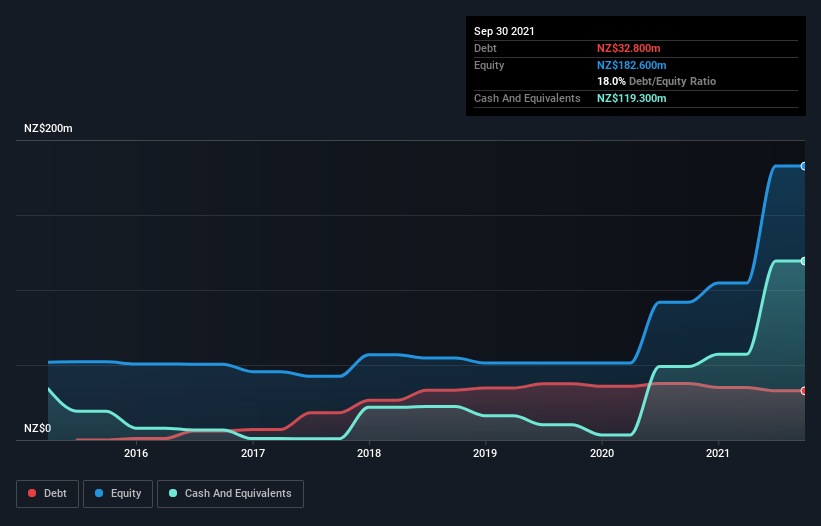Does EROAD (NZSE:ERD) Have A Healthy Balance Sheet?
David Iben put it well when he said, 'Volatility is not a risk we care about. What we care about is avoiding the permanent loss of capital.' It's only natural to consider a company's balance sheet when you examine how risky it is, since debt is often involved when a business collapses. We note that EROAD Limited (NZSE:ERD) does have debt on its balance sheet. But the real question is whether this debt is making the company risky.
What Risk Does Debt Bring?
Debt assists a business until the business has trouble paying it off, either with new capital or with free cash flow. Part and parcel of capitalism is the process of 'creative destruction' where failed businesses are mercilessly liquidated by their bankers. However, a more frequent (but still costly) occurrence is where a company must issue shares at bargain-basement prices, permanently diluting shareholders, just to shore up its balance sheet. Of course, debt can be an important tool in businesses, particularly capital heavy businesses. When we think about a company's use of debt, we first look at cash and debt together.
See our latest analysis for EROAD
How Much Debt Does EROAD Carry?
As you can see below, EROAD had NZ$32.8m of debt at September 2021, down from NZ$37.6m a year prior. But on the other hand it also has NZ$119.3m in cash, leading to a NZ$86.5m net cash position.

How Strong Is EROAD's Balance Sheet?
We can see from the most recent balance sheet that EROAD had liabilities of NZ$38.5m falling due within a year, and liabilities of NZ$33.1m due beyond that. Offsetting these obligations, it had cash of NZ$119.3m as well as receivables valued at NZ$12.7m due within 12 months. So it actually has NZ$60.4m more liquid assets than total liabilities.
This short term liquidity is a sign that EROAD could probably pay off its debt with ease, as its balance sheet is far from stretched. Simply put, the fact that EROAD has more cash than debt is arguably a good indication that it can manage its debt safely.
One way EROAD could vanquish its debt would be if it stops borrowing more but continues to grow EBIT at around 11%, as it did over the last year. There's no doubt that we learn most about debt from the balance sheet. But it is future earnings, more than anything, that will determine EROAD's ability to maintain a healthy balance sheet going forward. So if you want to see what the professionals think, you might find this free report on analyst profit forecasts to be interesting.
But our final consideration is also important, because a company cannot pay debt with paper profits; it needs cold hard cash. While EROAD has net cash on its balance sheet, it's still worth taking a look at its ability to convert earnings before interest and tax (EBIT) to free cash flow, to help us understand how quickly it is building (or eroding) that cash balance. During the last three years, EROAD burned a lot of cash. While that may be a result of expenditure for growth, it does make the debt far more risky.
Summing up
While it is always sensible to investigate a company's debt, in this case EROAD has NZ$86.5m in net cash and a decent-looking balance sheet. On top of that, it increased its EBIT by 11% in the last twelve months. So we don't have any problem with EROAD's use of debt. The balance sheet is clearly the area to focus on when you are analysing debt. But ultimately, every company can contain risks that exist outside of the balance sheet. For instance, we've identified 2 warning signs for EROAD that you should be aware of.
If you're interested in investing in businesses that can grow profits without the burden of debt, then check out this free list of growing businesses that have net cash on the balance sheet.
Valuation is complex, but we're here to simplify it.
Discover if EROAD might be undervalued or overvalued with our detailed analysis, featuring fair value estimates, potential risks, dividends, insider trades, and its financial condition.
Access Free AnalysisHave feedback on this article? Concerned about the content? Get in touch with us directly. Alternatively, email editorial-team (at) simplywallst.com.
This article by Simply Wall St is general in nature. We provide commentary based on historical data and analyst forecasts only using an unbiased methodology and our articles are not intended to be financial advice. It does not constitute a recommendation to buy or sell any stock, and does not take account of your objectives, or your financial situation. We aim to bring you long-term focused analysis driven by fundamental data. Note that our analysis may not factor in the latest price-sensitive company announcements or qualitative material. Simply Wall St has no position in any stocks mentioned.
About NZSE:ERD
EROAD
Provides electronic on-board units and software as a service to the transport industry in New Zealand, the United States, and Australia.
Excellent balance sheet and good value.
Market Insights
Weekly Picks

Solutions by stc: 34% Upside in Saudi's Digital Transformation Leader


The AI Infrastructure Giant Grows Into Its Valuation
Recently Updated Narratives


The "AI-Immunology" Asymmetric Opportunity – Validated by Merck (MSD)


The Hidden Gem of AI Hardware – Solving the Data Center Bottleneck


Moving from "Science Fiction" to "Science Fact" – A Bullish Valuation Case
Popular Narratives


MicroVision will explode future revenue by 380.37% with a vision towards success


NVDA: Expanding AI Demand Will Drive Major Data Center Investments Through 2026



